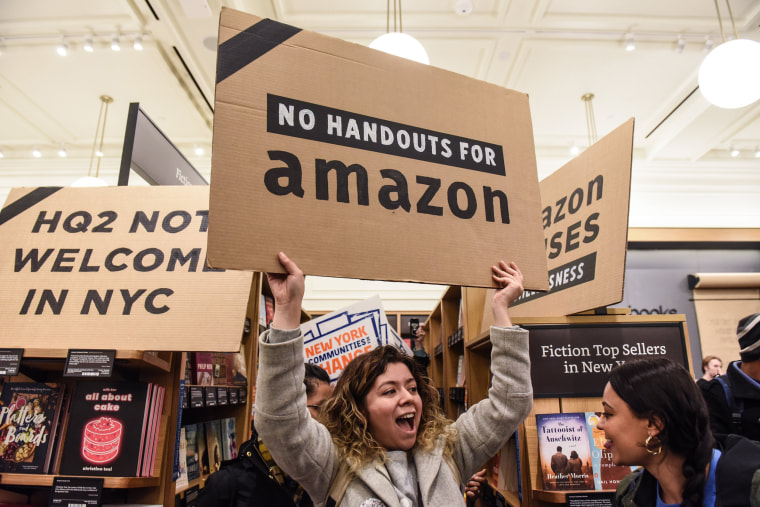Opponents of Amazon's New York development hailed the company's decision to pull the plug as a victory — but economic experts fear it's a loss that could haunt the city for generations to come.
Gov. Andrew Cuomo had called the deal with Amazon the largest economic development in New York state history, one that would bring up to 40,000 high-paying jobs to New York City and billions of dollars in much-needed tax revenue to the city and state.
Opponents, including local activists and politicians, decried the backroom process that had been used to broker the deal, and launched protests aimed at Amazon's anti-union history and the $3 billion in tax breaks and incentives the company was set to receive.
Some celebrated Thursday's decision at a rally in Queens that included one of the deal's most outspoken opponents — City Council member Jimmy Van Bramer.
"Defeating an unprecedented act of corporate welfare is a triumph that should change the way we do economic development deals in our city & state forever," he tweeted.
Economic experts told NBC News there's nothing to celebrate.
"The short-sighted view is they won this battle," said Thomas Cooke, professor at Georgetown University’s McDonough School of Business.
Amazon was in line for generous incentive packages, but Cooke said that those would have been small compared to the tax income from the company.
"Amazon would have paid back far more than it was taking," Cooke said.
The state and the city had said that even with the breaks and subsidies, the deal would have created $27.5 billion in tax revenue over the next 25 years — a 9-to-1 payout on the investment.
It also would have helped diversify the city's economy and been a significant boost for the goal of turning New York into a tech hub, the experts said.
"It's a shame. On the face of it, the economic basics looked reasonable," said Ari Ginsberg, a professor of entrepreneurship and management at New York University's Stern School of Business. "This is a situation where the upside was so high."
Amazon's presence in the Long Island City neighborhood of Queens would have attracted other tech firms, Ginsberg said, and their diverse portfolio — shipping, video, books and more — would have spurred other businesses as well.
"This was a big fish," Ginsberg said. Amazon would have created a "positive loop — the ecosystem continues to grow new firms. Amazon would have been providing new sources of tax revenue in a city with crumbling infrastructure."
The deal was also set to bring neighborhood improvements — a new waterfront park, a school and job training for residents of a nearby housing project, the Queensbridge Houses.
And while activists maintained that the city and state can now spend the $3 billion in breaks Amazon was slated to receive on fixing the subway, Ginsberg called that claim nonsensical.
He noted that the city and state weren't cutting Amazon a check — they were giving the company a break on the taxes it would pay in the future. Now there's no tax money to discount, and no tax money for the city and state to pocket.
Cooke said the dashed agreement could also make businesses hesitant about making deals to come to New York.
"It’s going to have a chilling effect on anyone negotiating with the state and the city," Cooke said. "By the end of the day, the deal we make might not be reality."
After Amazon announced it was pulling out of the deal, politicians from Texas and New Jersey said they'd happily welcome the jobs. Stephen Moret, the president of the Virginia Economic Development Partnership, said in a statement that "we are grateful for the roughly 10,000 jobs the company already has created here," and added that the state offers "a stable business climate."
That's not to say the Amazon venture was handled well. Both Ginsberg and Cooke said Cuomo and New York City Mayor Bill de Blasio made the deal a minefield by failing to include local lawmakers in the deal-making. The city council, in particular, was cut out of its usual role in land-use planning under the terms of the closed-door deal with Amazon.
"If you're going to negotiate these kinds of deals, there's a greater need to be inclusive," Ginsberg said.
While they lined up some labor unions who supported the deal — one would have enjoyed 1,500 construction jobs — others protested, given Amazon's history of fighting attempts to unionize.
Amazon didn't seem prepared for the criticism.
"Cuomo, de Blasio and Amazon all deserve blame," said Mitchell Moss, director of the Rudin Center for Transportation at NYU. "The mayor and governor thought they could get this done by avoiding the city council. They could not get around the activist culture."
"Amazon didn't have the skills" to cope with the fallout. Moss said.
"It's not a surprise that a company that was nurtured in the rainy climate of Seattle could not handle the sun and light of New York," he said.
Tim Bartik, senior economist at the W.E. Upjohn Institute for Employment Research, predicted New York would weather the storm just fine.
"I think New York will obviously suffer some loss of jobs," but other companies and positions will help fill the gap, he said. "The net effect in New York is going to be smaller" because "the city attracts jobs," he added.
Bartik said the deal's failure may spur states to reconsider incentive programs.
"There are controversies when you have big incentives," he said.
As for Amazon, "they might want to rethink how they handle community relations."

